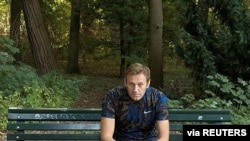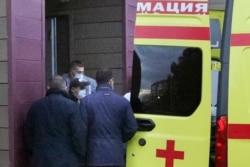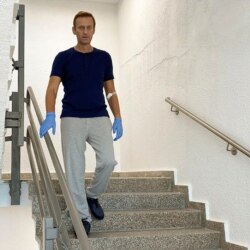Russian opposition leader Alexei Navalny was discharged Wednesday from a Berlin hospital — raising the prospect of his eventual return to Russia little more than a month after falling ill from a poisoning attack that has strained already difficult Russia-West relations.
“The patient’s condition had improved sufficiently for him to be discharged from acute inpatient care,” said a statement from the Charité Hospital in Berlin, where Navalny has spent the past 32 days — much of them in an artificially induced coma and under heavy police protection.
“Based on the patient’s progress and current condition, the treating physicians believe that complete recovery is possible. However, it remains too early to gauge the potential long-term effects of his severe poisoning,” the statement said.
Navalny later issued a post to social media that included a picture of himself on a park bench surrounded by trees.
“My plans are simple for now: physiotherapy every day,” wrote Navalny.
“I asked [doctors] what should I do more quickly return to form not only physically but with my mind. And I liked the answer,” he added.
“Read more, write on social media, and play video games.”
Siberian journey
A leading critic of Russian President Vladimir Putin, Navalny fell violently ill August 20 while flying home during a campaign trip from Siberia to Moscow.
An emergency landing and initial treatment by Russian doctors in the city of Omsk offered few clues as to what had happened.
The Omsk doctors insisted they could find no traces of poison.
But they also delayed initial requests by Navalny’s family to evacuate him for treatment elsewhere — a move supporters interpreted as an attempt to hide any lingering evidence of what had felled the politician.
Upon his subsequent evacuation to a clinic in Berlin, German Chancellor Angela Merkel said toxicologists had "unequivocal proof” that Navalny had been poisoned with Novichok — a Soviet-era military grade toxin.
Swedish and French laboratories have since confirmed those findings.
The Organization for the Prohibition of Chemical Weapons (OPCW) said it also would carry out its own tests at Germany’s request.
Russia vigorously denies the charges but also has refused to launch an official investigation — arguing it has yet to see proof of a crime and suggesting Navalny suffered from a metabolic disease or low blood sugar.
Additionally, Russia has criticized Germany for failing to provide proof or share evidence of its Novichok findings.
Navalny’s supporters argue the discovery of Novichok traces means the attack could only have been ordered by President Putin — an accusation the Kremlin has vigorously denied.
One step at a time
Navalny had been tracking his progress in a series of recent posts to social media that show him looking gaunt but full of the trademark acerbic humor that has drawn numerous fans, particularly among younger Russians.
The German doctors “have transformed me from a “technically alive person” into someone who has a chance to achieve the highest form of existence in our universe: a guy who knows how to quickly scroll through Instagram and without thinking, ‘like’ photos,” he wrote in a post earlier this week that showed him standing unaided.
His team also has insisted Navalny has every intention of returning to Russia to resume his political activities upon his full return to health — a notion that suddenly seemed more palpable with Navalny’s announced discharge Wednesday from the hospital.
When asked about the prospect of Navalny’s return by journalists Wednesday, Kremlin spokesman Dmitry Peskov said, “like any Russian citizen, he can do that, at any moment.”
Peskov added the Kremlin would make no special arrangements for Navalny “if the patient won’t show desire or intent to in some way share with our investigators the information that he’s actively sharing with police in Germany and other countries.”
The case has caused a diplomatic rift between Moscow and European capitals.
U.S. Secretary of State Mike Pompeo also has hinted at possible future sanctions from Washington — pointing to the American response in the wake of a similar poisoning attack against a former Russian spy, Sergei Skripal, and his daughter in 2018 that Britain blames on Russia.
"The United States has made it clear the use of chemical weapons is unacceptable. When a chemical weapon was used against the Skripals, we took a very strong response,” said Pompeo in comments to Germany’s Bild newspaper earlier this week.
“There is no reason to anticipate the United States won't react in a way that does justice to what may have taken place once all the facts are available," he said.
Indeed, Kremlin officials repeatedly have complained that Germany and other European laboratories have refused to share their findings.
Russian officials have openly floated conspiracy theories that Germany — or, perhaps, even Navalny himself — may have staged the attack in a false-flag operation to initiate another round of western-backed reprisals.
In a post to his Instagram account earlier this week, though. Navalny mocked the suggestion he’d staged his own near-death experience to damage the Kremlin.
“To die in an Omsk hospital and end up in the morgue there — where they’d determine my cause of death as “he lived long enough” — well, that was the goal of my master plan,” wrote Navalny.
“But Putin outfoxed me,” he added,” “and in the end I, like a fool, lay in a coma for 18 days but failed to die.”
“My provocation has failed!”






